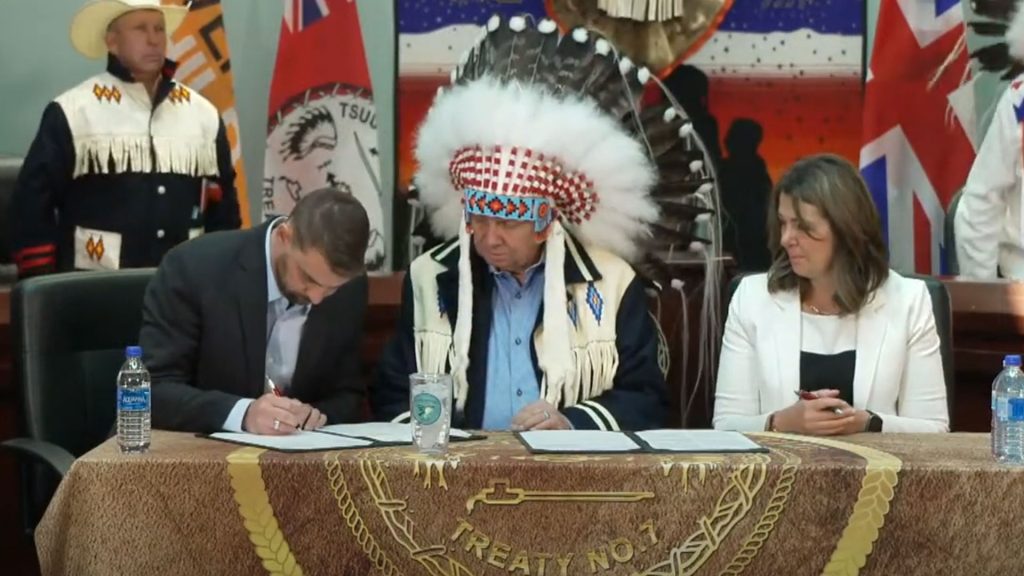
Tsuut'ina Chief signing memorandum of understanding with provincial government for a new treatment centre. Photo: YourAlberta YouTube.
Tsuut’ina First Nation in Alberta signed an agreement with the province for up to $30 million to build addiction treatment capacity on First Nations lands Wednesday.
Smith has signed other agreements with First Nations, such as the announcement of $30 million in capital costs funding for a new recovery centre in Enoch Cree Nation. This is a continuation of Smith’s election promises to focus on a recovery oriented model for addiction treatment.
There was no timeline in this announcement but the plan is to create a treatment centre to support up to 300 people per year.
“We are dealing with synthetic opioids that are cheap, easy to conceal and incredibly powerful,” said Chief Roy Whitney from Tsuut’ina Nation outside of Calgary.
“It is easy to point fingers at Big Pharma creating opioid addictions… local gangs and distributors but pointing fingers does not reach the solution.”
Whitney acknowledged that there are different opinions on dealing with the opioid crisis but said he “stands with the premier and her cabinet on the track that they are creating”
“No one would believe that the answer to alcohol abuse is more and cheaper alcohol,” he said.
This is in reference to some advocates calling for harm reduction and safe supply of opioids, rather than the Alberta government’s “recovery oriented” approach which focuses on putting drug users into treatment for their addiction.
Although some chiefs, such as Whitney and Chief Cody Thomas from Enoch have spoken in favour of the recovery oriented model, there is some evidence that Indigenous groups have not been widely consulted on addictions treatment models.
The province released this plan from its mental health and addictions advisory council, which had two First Nations representatives, including one who works for Kainai but does not appear to identify as Indigenous, in a committee of 17 but didn’t include any Indigenous advocacy groups or training organizations.
The Calgary and Edmonton public safety community response task forces, which were created in part to address the opioid crisis and its effect on the two major cities in the province, have Jodi Two Guns, executive director of social development for Tsuut’ina Nation, Chief Billy Morin from Enoch Cree Nation and Chief Isaac A Laboucan-Avirom from Woodland Cree First Nation.
Marilyn Buffalo, the CEO of Nechi Institute, which offers counselling and training services for addictions recovery across the country told APTN News that this issue with opioids is much larger than Alberta.
“We have a national health crisis. It is not just Alberta. it is nationwide,” said Buffalo. “There’s not an hour in my day that I have to myself where I am not getting crisis calls from chiefs, from counsellors and grandparents, parents, social workers, nurses, doctors, the list goes on.”
Nechi has trained over 15,000 counsellors in addictions treatment across the country. Despite being an established service provider Buffalo said she was not consulted on the government’s addiction treatment plans.
“My hope is that the Alberta government and the federal government and the First Nations governments contact Nechi. We have been doing this work for 49 years using tried and true methods,” said Buffalo.
Read More:
First Nations life expectancy plummets in Alberta due to opioid deaths
Federal government and province at odds regarding addictions treatment approach
“Unfortunately, over the past four years we’ve seen the federal government abdicate its responsibility in this area,” said Smith. “They’ve significantly decreased federal support to Indigenous communities for both addictions and healthcare support.”
Patty Hajdu, federal minister of Indigenous services told APTN that the Liberal government has made “historic” investments in both mental health and addictions services.
“Danielle Smith and Pierre Poilievre are choosing to further entrench the stigma that Indigenous peoples face as they play politics with the mental health of Indigenous communities. That’s a new low.”
“We are making historic investments for culturally-appropriate mental health and addictions services that work and save lives. I invite them to leave the political bubble, go on the ground and actually listen to the needs of Indigenous communities.”
The federal government has pledged nearly 1.2 billion dollars in project dollars for Indigenous-led mental health services, including $359 million to support a renewed Canadian Drugs and Substances Strategy.
APTN asked the premier about criticism of the recovery oriented model versus safe consumption sites.
“We have not closed safe consumption sites. What we are doing is augmenting them with a recovery-oriented approach,” said Smith.
As APTN previously reported, the Lethbridge safe consumption site was closed in 2020 under former premier, Jason Kenney. Like Smith, Kenney was the leader of the United Conservative Party.
According to a plan released by the Alberta government, their recovery model is focusing on being “proactive” in their care. They refer to the current model of addictions recovery as “multiple disjointed services and programs that are not regularly evaluated, nor have evidence to support their continuation,” reads the plan.
By contrast they say they want to move to “evidence-based supports and services that are responsive to rigorous emerging evidence.”










